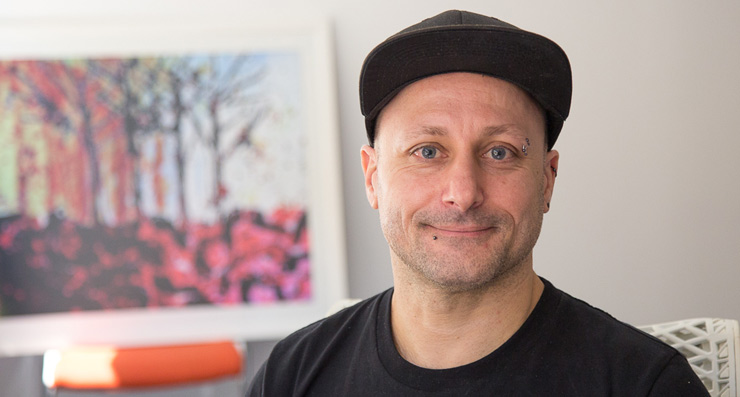 Bé reluctantly steps into the bathroom. He feels overwhelmed. To him, the bathroom is untidy. Unclean. His chest tightens and he reminds himself to breathe.
Bé reluctantly steps into the bathroom. He feels overwhelmed. To him, the bathroom is untidy. Unclean. His chest tightens and he reminds himself to breathe.
He approaches the basin with caution. As warm water runs from the tap he puts soap onto his hands and begins to wash them.
But this is just the beginning. Lather, scrub, rinse, repeat. Repeat. Repeat. Repeat… One hour passes. The door knocks. His chest tightens. Hot flushes become intense as a deep frustration starts to build inside him.
“I’ll be out soon” he yells.
The ritual has been disrupted. He must restart.
He is exhausted.
He swallows and begins again.
For as long as Bé can recall, he has experienced Obsessive Compuslive Disorder (OCD), a large point of distress being hygiene. For nearly twenty years he has undergone various forms of treatment. His sense of self being challenged as he has learnt to deal with his OCD.
Now he has become a mentor and role model for consumers, displaying that people who experience OCD can learn to manage their symptoms and lead a functional life.
Bé’s OCD predates his memory. Throughout his childhood he always felt different. He was constantly checking and scrubbing himself, spending hours in the shower performing rituals until he felt ‘clean’.
With age his experiences worsened. As he entered his later high school years, he sensed he had a growing problem, but he was unaware it was Obsessive Compulsive Disorder.
“I thought it was just my personality, my behaviour and attitude. I thought if I really wanted to stop I could… I would try to make myself spend less time in the shower. But I automatically just went back into the OCD cleaning rituals and patterns of behaviour.”
His obsession consumed him. He was unable to study for his HSC, he could complete his TAFE course and he found it difficult to secure employment.
During his early twenties, while living with his parents, he became bed ridden. The prospect of leaving his room seemed unbearable. The outside world was a place filled with anxiety triggers. His parents were extremely concerned.
“My parents didn’t understand what was going on. There was a lot of tension at home and I copped a lot of flak. Finally when I was at my worse they convinced me to see a Doctor and he referred me to a specialist. I went on medication and a treatment program. Within a few months I did improve but it was very difficult and I still had anxiety symptoms there.”
A highly effective form of treatment for checking and cleaning OCD is Cognitive Behaviour Therapy (CBT). The most common practice of CBT is Exposure and Response Prevention (ERP). This is done by making OCD sufferers resist performing rituals, as well as engaging with settings and thoughts associated with anxiety. This can be carried out with or without medication, depending on what is suitable to the individual.
A report by the Stanford School of Medicine states, “about 50 per cent of patients presenting for treatment can benefit from behaviour therapy without medications… At follow-up six months to three or more years after treatment, 65 to 75 per cent of patients are more improved, but 25 per cent show no lasting benefit.”
For Bé, his coping strategies are broad. One example is in the last couple of years he has taken up Latin dancing as a way to motivate him to stay social and active.
Along with treatment and staying social through dancing, one of the most effective strategies to manage his OCD is attending support group meetings. After attending numerous support groups over the years, he decided to start his own Anxiety Disorder Support Group in Bankstown. He feels his personal experience with anxiety places him in a position where he can aid people in the beginning stages of understanding their symptoms.
“Having lived these experience helps me understand what people are going through… I guess the most important thing is about listening, understanding that people need you to validate their pain and suffering.
“I just want to say I truly, sincerely understand what you are going through. Sometimes it is lonely going through this pain and struggle and not being able to hear someone say ‘I understand.’”
Along with seeing their doctor, the Mental Health Association of NSW suggests people experiencing OCD or other anxiety symptoms would benefit tremendously by attending a support group in their area. It provides a space and an opportunity to connect and share with people going through similar experiences. Family and friends are also welcome to attend one of the many Anxiety or OCD Support Groups that are run in NSW. There is also a 12 week self-help program which can aid consumers.
Bé is taking steps to get his life on track. His commitment to improving and capacity to give time to provide volunteer work in the sector, has opened up various opportunities. This September he secured part-time employment as a Research Officer at the Social Policy and Research Centre at UNSW. He will be working to evaluate mental health services in Eastern Sydney.
One of the most important messages that can be obtained from Bé’s experience is that OCD and anxiety disorders are challenging but recovery is possible.
“I’ve reached a position where I’m functional in a dysfunctional manner. The thoughts are still there, so it hasn’t one hundred per cent disappeared. I’m trying to minimise and manage the symptoms and continue improving on my recovery. I haven’t given up hope that I can get rid of my OCD completely.”
-Written by Ellie Hills
Learn more of Bé’s story
Bé is a great believer in WayAhead’s Anxiety Support groups – hear what he has to say

